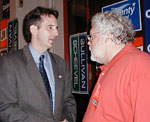By Laura McCallum
Minnesota Public Radio
June 5, 2002
The two Republicans seeking party endorsement for governor are nearly neck and neck heading into the state party convention. Non-binding straw polls of delegates show entrepreneur Brian Sullivan with a slim lead over House Majority Leader Tim Pawlenty. One of the defining issues may be the matter of money.
| |
|
|
|
||
Sullivan made millions building and eventually selling his water purification business, and could potentially spend those millions on the race for governor. The Orono businessman says he'll reject public campaign subsidies, so he won't have to abide by the campaign spending limit of about $2.4 million. Sullivan says as a first-time candidate, he needs to buy TV and radio ads to get his message out to Minnesotans.
"My family's making a sacrifice; we are going to spend some of our own money in this race, money that I busted my tail to earn, and I started off with a couple thousand bucks and it happened to work out. But we believe it's important, we're willing to put my money where my mouth is," Sullivan says.
Sullivan says he's not self-financing the race, and points out that about 5,000 Minnesotans have already contributed to his campaign. Sullivan contributed nearly $1 million to his campaign last year. His rival for the Republican endorsement, Tim Pawlenty, says he'll have raised about $700,000 by the convention.
Pawlenty's campaign says Sullivan will spend close to $2 million to try to get party backing, based on the amount of TV and radio ads he's already run. Sullivan's campaign will neither confirm nor refute that number. Pawlenty says Minnesotans have usually rejected wealthy candidates, including Republican Wheelock Whitney for governor in 1982 and Democrat Mike Ciresi for U.S. Senate in 2000.
"Unlike some other states, Minnesota has not been taken by this 'rich person buys the election' phenomena that you're seeing around in other states, so that's good and I don't think it will happen this year either," Pawlenty says. "In terms of just the tactical level, if Brian Sullivan blows the spending limits, everybody else gets to blow them too under Minnesota law, so in the end he will have no real advantage."
Sullivan's campaign says it's highly unlikely Democrats or the Independence Party could raise anywhere near what Sullivan could. At the last three Republican congressional district conventions last weekend, Sullivan told delegates his personal wealth is an advantage.
| |
|
|
|
||
"Now some will argue, will try to argue, that maybe resources don't matter; having more isn't an advantage over less. Well, if they're telling you that, they're not telling you the truth. Because with a resource advantage, I can define myself, I can get our message out directly to the people," Sullivan says.
Sullivan's argument made sense to Steve Van Der Berg of Maple Grove, an uncommitted delegate to the state convention. "I think Tim has said that it's a disadvantage because the Democrats will just spend more, but I read something from Brian's campaign that said the Democrats would never raise that much money ever anyway, so it sounds like an advantage," he said.
Another delegate who's still trying to decide between Sullivan and Pawlenty is Minneapolis businessman John Alexander. He says money won't be a factor in his decision - he says it's understandable that Sullivan has outspent Pawlenty up to this point.
"He's coming into a new environment. He had to plan farther in advance, he started two years ahead of time. On the other hand, Tim's in that environment, he's got a good track record, more people in Minnesota probably knew who he was than Brian was two years ago, and maybe it's probably about fifty-fifty now. Tim didn't need to raise a lot of money," according to Alexander.
That may change once the general election campaign begins. Political scientist Steven Schier of Carleton College says whoever gets the Republican endorsement will probably have to spend a lot of money to get noticed this year.
"We're going to have this very big U.S. Senate race, and a lot of competitive U.S. House races, particularly in the metro area, there'll be a huge demand for advertising time on television," Schier says.
Sullivan says his resources mean he won't have to rely as heavily on free publicity from what he calls "Minnesota's liberal media". He says Republican gubernatorial candidate Norm Coleman couldn't get his message out to voters in 1998, when he lost to Jesse Ventura. Pawlenty says money wasn't the issue four years ago; he says Coleman outspent Ventura by at least seven to one.
More from MPR

